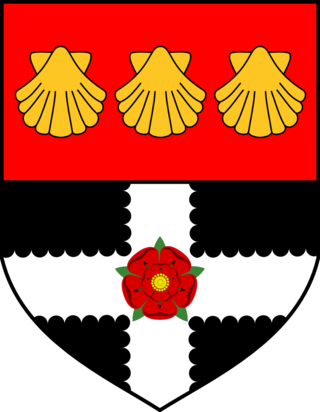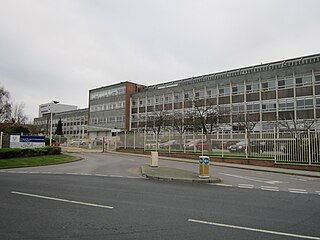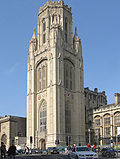
Andrew Stuart Tanenbaum, sometimes referred to by the handle ast, is an American-Dutch computer scientist and professor emeritus of computer science at the Vrije Universiteit Amsterdam in the Netherlands.

The Eindhoven University of Technology, abbr. TU/e, is a public technical university in the Netherlands, situated at Eindhoven. In 2020–21, around 14,000 students were enrolled in its BSc and MSc programs and around 1350 students were enrolled in its PhD and PDEng programs. In 2021, the TU/e employed around 3900 people.

Janet is a high-speed network for the UK research and education community provided by Jisc, a not-for-profit company set up to provide computing support for education. It serves 18 million users and is the busiest National Research and Education Network in Europe by volume of data carried. Previously, Janet was a private, UK-government funded organisation, which provided the JANET computer network and related collaborative services to UK research and education.

Carnegie Mellon University (CMU) is a private research university in Pittsburgh, Pennsylvania. The institution was originally established in 1900 by Andrew Carnegie as the Carnegie Technical Schools. In 1912, it became the Carnegie Institute of Technology and began granting four-year degrees. In 1967, it became the current-day Carnegie Mellon University through its merger with the Mellon Institute of Industrial Research, founded in 1913 by Andrew Mellon and Richard B. Mellon and formerly a part of the University of Pittsburgh.

The University of Bristol is a red brick Russell Group research university in Bristol, England. It received its royal charter in 1909, although it can trace its roots to a Merchant Venturers' school founded in 1595 and University College, Bristol, which had been in existence since 1876.

The University of Liverpool is a public research university in Liverpool, England. Founded as a college in 1881, it gained its Royal Charter in 1903 with the ability to award degrees, and is also known to be one of the six 'red brick' civic universities, the first to be referred to as The Original Red Brick. It comprises three faculties organised into 35 departments and schools. It is a founding member of the Russell Group, the N8 Group for research collaboration and the university management school is triple crown accredited.

The University of the West of England is a public research university, located in and around Bristol, England, UK. With more than 30,000 students and 3,000 staff, it is the largest provider of higher education in the South West of England.

Ben-Gurion University of the Negev (BGU) is a public research university in Beersheba, Israel. Ben-Gurion University of the Negev has five campuses: the Marcus Family Campus, Beer Sheva; the David Bergmann Campus, Beer Sheva; the David Tuviyahu Campus, Beer Sheva; the Sede Boqer Campus, and Eilat Campus.

The University of Reading is a public research university in Reading, Berkshire, England. It was founded in 1892 as University College, Reading, a University of Oxford extension college. The institution received the power to grant its own degrees in 1926 by royal charter from King George V and was the only university to receive such a charter between the two world wars. The university is usually categorised as a red brick university, reflecting its original foundation in the 19th century.

The Department of Computer Science at the University of Manchester is the longest established department of Computer Science in the United Kingdom and one of the largest. It is located in the Kilburn Building on the Oxford Road and currently has over 800 students taking a wide range of undergraduate and postgraduate courses and 60 full-time academic staff.

Sir Andrew Hopper is a British-Polish computer technologist and entrepreneur. He is treasurer and vice-president of the Royal Society, Professor of Computer Technology, former Head of the University of Cambridge Department of Computer Science and Technology, an Honorary Fellow of Trinity Hall, Cambridge and Corpus Christi College, Cambridge.

The Department of Computer Science is the computer science department of the University of Oxford, England, which is part of the university's Mathematical, Physical and Life Sciences Division. It was founded in 1957 as the Computing Laboratory. By 2014 the staff count was 52 members of academic staff and over 80 research staff. The 2019, 2020 and 2021 Times World University Subject Rankings places Oxford University 1st in the world for Computer Science. Oxford University is also the top university for computer science in the UK and Europe according to Business Insider. The 2020 QS University Subject Rankings places The University of Oxford 5th in the world for Computer Science.

Margaret Ann Boden is a Research Professor of Cognitive Science in the Department of Informatics at the University of Sussex, where her work embraces the fields of artificial intelligence, psychology, philosophy, and cognitive and computer science.

Sir Steven George West is a British podiatrist, the vice-chancellor, president and chief executive officer of the University of the West of England since 2008. He holds a number of national and international advisory appointments in higher education, healthcare policy and regional government.

The Unilever Research & Development Port Sunlight Laboratory is the multinational consumer goods company Unilever's main research and development facility in the United Kingdom. It is located in Bebington, Merseyside.

Rayalaseema University is a state university located in Kurnool, Andhra Pradesh, India.

The UCL Division of Psychology and Language Sciences is a Division within the Faculty of Brain Sciences of University College London (UCL) and is located in London, United Kingdom. The Division offers teaching and training and undertakes research in psychology and communication and allied clinical and basic science. It is the largest university psychology department in England.
The Roger Needham award is a prize given scientists who are recognised for important contributions made to computer science research The British Computer Society established an annual Roger Needham Award in honour of Roger Needham in 2004. It is a £5000 prize is presented to an individual for making "a distinguished research contribution in computer science by a UK-based researcher within ten years of their PhD." The award is funded by Microsoft Research. The winner of the prize has an opportunity to give a public lecture.
The Scientific Advisory Group for Emergencies (SAGE) is a British Government body that advises central government in emergencies. It is usually chaired by the United Kingdom's Chief Scientific Adviser. Specialists from academia and industry, along with experts from within government, make up the participation, which will vary depending on the emergency. SAGE gained public prominence for its role in the 2020 COVID-19 pandemic in the United Kingdom.


















